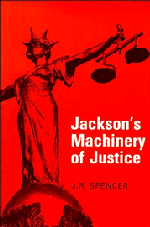Book contents
- Frontmatter
- Contents
- Acknowledgements
- List of figures
- List of tables
- Preface
- Preface to the first edition of ‘The Machinery of Justice in England’
- Abbreviations
- I Historical introduction
- II Civil jurisdiction
- III Tribunals
- IV Criminal jurisdiction
- 19 Courts with original criminal jurisdiction
- 20 Coroners' Courts
- 21 Courts with appellate criminal jurisdiction
- 22 The process of prosecution
- 23 Criminal procedure
- 24 The process of sentencing (including probation)
- 25 Juvenile courts
- 26 The matrimonial jurisdiction of magistrates – the Domestic Court
- V The personnel of the law
- VI The European dimension
- VII The cost of the law
- VIII Law Reform
- Appendix A The Report of the Civil Justice Review
- Table of Cases cited
- Table of Statutes cited
- Table of Stationery Office publications cited
- Index
23 - Criminal procedure
Published online by Cambridge University Press: 10 January 2011
- Frontmatter
- Contents
- Acknowledgements
- List of figures
- List of tables
- Preface
- Preface to the first edition of ‘The Machinery of Justice in England’
- Abbreviations
- I Historical introduction
- II Civil jurisdiction
- III Tribunals
- IV Criminal jurisdiction
- 19 Courts with original criminal jurisdiction
- 20 Coroners' Courts
- 21 Courts with appellate criminal jurisdiction
- 22 The process of prosecution
- 23 Criminal procedure
- 24 The process of sentencing (including probation)
- 25 Juvenile courts
- 26 The matrimonial jurisdiction of magistrates – the Domestic Court
- V The personnel of the law
- VI The European dimension
- VII The cost of the law
- VIII Law Reform
- Appendix A The Report of the Civil Justice Review
- Table of Cases cited
- Table of Statutes cited
- Table of Stationery Office publications cited
- Index
Summary
Practically all criminal cases come before justices of the peace, either to be tried summarily or for committal proceedings. Most of the summary cases and a few that are more serious are begun by the prosecutor ‘laying an information’ which comes before a justice or a justices' clerk, who authorises the issue of a summons which will be served on the defendant. A summons states the alleged offence and gives the date and place where the defendant is to appear. In the case of a person who would probably disregard a summons, the prosecutor may ask for a warrant of arrest as the initial step; this application must be made upon a sworn statement. The granting of summonses and warrants need not be done in open court; in the case of warrants for arrest it would often be unwise to advertise the steps that are being taken. In many cases there is neither summons nor warrant, for the accused has been arrested and charged at the police station and he appears before the magistrates' court on police bail or in custody. Where the police proceed by this method a copy of the charge-sheet is sent to the magistrates' court, and this constitutes ‘laying the information’.
- Type
- Chapter
- Information
- Jackson's Machinery of Justice , pp. 255 - 271Publisher: Cambridge University PressPrint publication year: 1989

